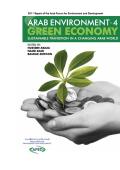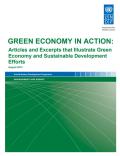

The Green Economy is one in which the vital linkages among the economy, society, and environment are taken into account. This selection of articles and excerpts emerged in response to the need to fill the knowledge gap on practical, concrete, and on the ground green economy country experience. It is in this spirit that the articles and excerpts included in this publication have been selected: to provide information and knowledge for policy and decision makers and practitioners on the positive implications of greening some priority sectors, including job creation, resource efficiency, and generally contribution to sustainable development through an extensive review of scientific publications and magazines.
The sectors analysed are water, agriculture, energy, industry, business, ecosystems, technology, waste management. The report contains several case studies, including from China, Egypt, the United Arab Emirates, the United Kingdom and Europe.
This report reviews the economic and environmental consequences of resource inefficiency in Asia and the Pacific and some of its underlying causes. It examines a range of technical, policy, and institutional responses to encourage corporations and consumers alike to adopt more resource-efficient behaviors, with particular attention to the vital role governments must play in creating incentive structures, encouraging research and development for new technologies, improving institutions and information exchange, and other measures to move the region’s economies toward greater resource efficiency. This analysis is a contribution to the global G8 3R Initiative, which seeks to promote the “reduce, reuse, recycle” approach to waste management. While many of the specific strategies described are not new, the report should contribute to an understanding of the underlying reasons behind resource inefficiency, tools for its analysis, and specific interventions tailored to the Asia and Pacific context.
The report includes case studies from China, India, Japan, Lao, Nepal, Philippines and Thailand.
Why were participant countries in the Rio+20 conferences (2012) not able to find any common ground on the role of intellectual property rights (IPRs) as they sought to identify a path for achieving “green economy” in the decades ahead? The current policy brief seeks to answer this question by examining the evolution of the global debate on IPRs and green technologies from the Earth Summit in 1992 to Rio+20.
The document indicates that:
The Design for Sustainability (D4S) concept outlines methodologies for making sustainable improvements (social, economic and environmental) to products by applying elements of life cycle thinking. D4S builds on the work of ecodesign to include economic and social concerns, and its methodology includes both incremental and radical innovation. The United Nations Environment Programme and the Delft University of Technology, the Netherlands, in concert with key partners, work to support, illustrate, and diffuse targeted D4S demonstration efforts, including the European Commission-funded Cleaner Production for Better Products project in Vietnam, that are needed to change unsustainable consumption and production patterns.
